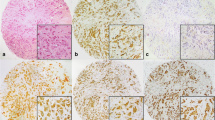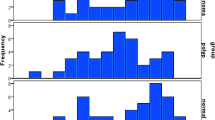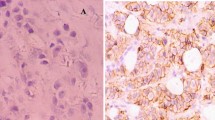Abstract
Objective: Survivin is a member of the inhibitor of apoptosis (IAP) family, and is involved in the regulation of cell division. E-cadherin functionally belongs to transmembrane glycoproteins family, it is responsible for intercellular junction mechanism that is crucial for the mutual association of vertebrate cells. These genes are thought to be associated with cancer aggression. This study was to investigate the relationship between surviving gene, E-cadherin expression and invasion clinicopathological features of breast cancer. Methods: The expression of surviving gene and E-cadherin were detected by SP immunohistochemical technique in tissues of 66 breast cancer, 20 breast fibroadenoma and 20 adjacent breast tissue. Results: The positive rate of surviving gene expression in breast cancer was 42.2%, significantly higher (P=0.025) than those in breast fibroadenoma (35.0%), and adjacent breast tissue (10.0%). The positive rate of E-cadherin in the groups of adjacent breast tissue, breast fibroadenoma and breast cancer were 100%, 100% and 42.4%, there was significant difference between the group of benign and malignant tumor (P=0.005). The positive rate of surviving in breast cancer with local lymph node metastasis was significant higher than that in breast cancer without lymph node metastasis (P=0.01), and E-cadherin in breast cancer with local lymph node metastasis was significant lower than that without lymph node metastasis (P=0.01). There was no significant difference among the groups of pathological types and TNM stages in the expression of surviving (P=0.966 & P=0.856), but there was significant difference in the expression of E-cadherin among these groups (P=0.01 & P=0.023). Conclusion: The loss or decrease of E-cadherin expression may promote the exfoliation of cancerous cells from original tissues, and surviving gene may promote the viability of the exfoliated cancer cells and the formation of new metastasis focus. These 2 factors cooperate with each other in the process of metastasis and invasion. They have a close relation with the breast cancer clinicopathological features.
Similar content being viewed by others
References
Kishi H, Igawa M, Kikuno N, et al. Expression of the surviving gene in prostate cancer: correlation with clinicopathological characteristics, proliferative activity and apoptosis[J]. J Urol 2004; 171: 1855–60.
Kennedy SM, O’Driscoll L, Purcell R, et al. Prognostic importance of surviving in breast cancer[J]. Br J Cancer 2003; 88: 1077–83.
Kowalski PJ, Rubin MA, Kleer CG. E-cadherin expression in primary carcinomas of the breast and its distant metastases[J]. Breast Cancer Res 2003; 5: R217–22.
Bankfalvi A, Terpe HJ, Breukelmann D, et al. Immunophenctypic and prognostic analysis of E-cadherin and β-catenin expression during breast carcinogenesis and tumor progression: a comparative study with CD44[J]. Histopathology 1999; 34: 25–34.
Keitaro Tanaka, shinji Iwamoto, Goki Gon, et al. Expression of surviving and its relationship to loss of apoptosis in breast carcinomas[J]. Clinical Cancer Res 2000; 6: 127–34.
Oka H, Hitoshi Shiozaki H, Kobayashi K, et al. Expression of E-cadherin cell adhesion molecules in human breast cancer tissues and its relationship to metastasis[J]. Cancer Res 1993; 53: 1696–701.
Hirohashi. Inactivation of the E-cadherin mediated cell adhesion system in human cancer[J]. Am J Pathol 1998; 153: 333–9.
Ambrosini G, Adida C, Altieri DC. A novel anti-apoptosis gene, surviving, expressed in cancer and lymphoma[J]. Nat Med 1997; 3: 917–21.
Tanaka K, Iwamoto S, Gon G, et al. Expression of surviving and its relationship to loss of apoptosis in breast carcinomas[J]. Clin Cancer Res 2000; 6: 127–34.
Izawa A, Kobayashi A, Nasu S, et al. Relevance of c-erbB2, PLU-1 and surviving mRNA expression to diagnostic assessment of breast cancer[J]. Anticancer Res 2002; 22: 2965–70.
Nasu S, Yagihashi A, Izawa A, et al. Survivin mRNA expression in patients with breast cancer[J]. Anticancer Res 2002; 22: 1839–44.
Author information
Authors and Affiliations
Corresponding author
Additional information
Biography: TIAN Xiao-feng(1963–), male, doctor of medicine, professor, Department of General Surgical, Dalian Medical University, majors in surgical oncology.
Rights and permissions
About this article
Cite this article
Tian, Xf., Liu, Jh., Wang, Lf. et al. Expression of survivin and E-cadherin in breast cancer. Chin. J. Cancer Res. 17, 103–106 (2005). https://doi.org/10.1007/s11670-005-0052-z
Received:
Accepted:
Issue Date:
DOI: https://doi.org/10.1007/s11670-005-0052-z




